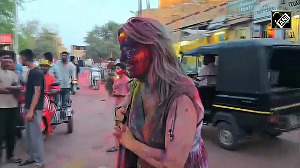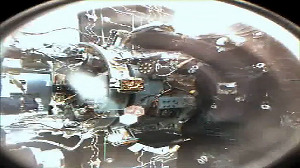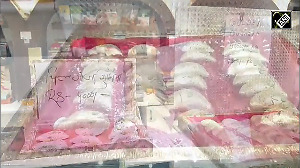Sri Lankan President Gotabaya Rajapaksa will have talks on Wednesday with the ruling party dissidents and the main Opposition Samagi Jana Balawegaya (SJB) to end the political impasse after the resignation of prime minister Mahinda Rajapaksa.

After nearly two days of political deadlock, the stakeholders are engaged in prolonged talks to try and appoint a successor to Mahinda Rajapaksa.
Mahinda, 76, resigned as prime minister on Monday amid unprecedented economic turmoil in the country, hours after his supporters attacked anti-government protesters, prompting authorities to impose a nationwide curfew and deploy Army troops in the capital. The attack triggered widespread violence against pro-Rajapaksa politicians.
"We will have more talks today (Wednesday). Hopefully we will see an end (of the political impasse) today," Anura Yapa, a senior leader of the independent group that had split from the ruling SLPP coalition, told PTI.
The main Opposition SJB, the ruling party dissidents and President Gotabaya Rajapaksa have been holding talks for the last two days without much success, according to sources.
'This is the time for all Sri Lankans to join hands as one, to overcome the economic, social & political challenges. I urge all #Srilankans to reject the subversive attempts to push you towards racial & religious disharmony. Promoting moderation, toleration & coexistence is vital,' the President said on Twitter.
Parliamentary sources said Speaker Mahinda Yapa Abeyawardene's plan to hold a party leaders' meeting on the reconvening of Parliament before its scheduled date next week has become difficult as parties had raised safety issues in the current volatile situation.
The Speaker would opt for an online meeting.
The main Opposition had handed over a motion of no trust against the government.
But the Speaker said it would be no longer relevant as the government had already stepped down.
The motion to express displeasure on the President has been placed on the order paper but Abeyawardene said it would also be of no use as the President would not be bound by any outcome of it.
Political sources said that President Mahinda Rajapaksa would be having one-to-one meetings with main Opposition leader Sajith Premadasa and former prime minister Ranil Wickremesinghe whose United National Party (UNP) has a solitary seat.
According to the Speaker, the independent group and former president Maithripala Sirisena's Sri Lanka Freedom Party (SLFP) could both provide external support to Premadasa to be the interim prime minister, and subsequently implement other reforms.
However, indications from the SJB are that Premadasa seeks the President's resignation for him to agree to be the interim prime minister.
The SJB has only 54 seats in the 225-member assembly and could bank on another 50 plus seats from the dissidents to be in charge of the country's affairs.
A group of protesters gathered around the Naval base in the eastern port district of Trincomalee, claiming Mahinda had taken refuge there.
Calls for his arrest are increasing for his alleged instigation of a mob which went on to attack anti-government protesters who are calling for the Rajapaksa family, including President Gotabaya Rajapaksa, to resign.
At least 8 people have died while over 250 people have been injured in the clashes which also saw scores of properties belonging to ruling party politicians being set on fire.
President Gotabaya has urged the people to stop 'violence and acts of revenge' against fellow citizens and vowed to address the political and economic crisis facing the nation Sri Lanka is facing its worst economic crisis since gaining independence from Britain in 1948.
The crisis is caused in part by a lack of foreign currency, which has meant that the country cannot afford to pay for imports of staple foods and fuel, leading to acute shortages and very high prices.
Thousands of demonstrators have hit the streets across Sri Lanka since April 9.











 © 2025
© 2025